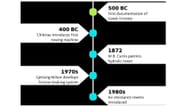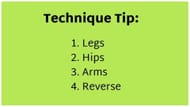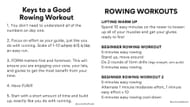The rowing machine exercise takes inspiration from Olympic rowing events which have been a part of the competition since its debut at the 1900 Summer Olympics held in Paris, France. The rowing machine, commonly referred to as an ergometer, will help you emulate the benefits of rowing in the water within the confines of your home or gym.
With the recent shift towards high intensity interval training and low-impact cardio, the rowing machine exercise has gained immense popularity and can be found in almost every gym nowadays.

What Are The Benefits of Using The Rowing Machine Exercise?
Rowing machines are routinely used by athletes and professional sportsmen for a variety of benefits such as:
- Improving endurance
- Utilizing nearly 85 percent of body musculature
- Activating more than nine muscle groups
- Helping build mental endurance and work capacity
- Increasing power output
- Improving full-body coordination
- Enhancing recovery
- Being an efficient form of low-impact cardio
- Can be used in HIIT routines
It is also a beginner-friendly exercise that will help build up basic physical conditioning and stamina. Since it burns around 400-600 calories in less than an hour depending on bodyweight and intensity, the rowing machine exercise is also a superior option for those looking to lose weight. They can also be used for light warmups before weight training.
What Are The Different Muscles Worked by Rowing Machines?
The ergometer is a full-body exercise that involves nearly 85 percent of total body musculature. While there is a common misconception that the rowing machine exercise is primarily an upper body movement, this couldn't be further from the truth.
In fact, the majority of your rowing power is generated by the legs and core. Ultimately, it is a total-body exercise that works the glutes, latissimus dorsi, rhomboids, shoulders, core, quads, biceps, triceps, and hamstrings.
How to Use The Rowing Machine With Proper Form?
There are four distinct phases involved in the rowing stroke:
1) The Catch
Lean slightly forward and grab the handle of the rowing machine. Your shoulders should be directly in front of your hips with your arms fully outstretched.Your shins should be almost vertical to the floor. The seat should be six to eight inches from the feet and the heels should be slightly lifted. Maintain a flat back and a tight core.
2) The Drive

The drive is the most explosive part of the rowing machine exercise. Begin the drive by extending at the knees. Continue till the legs are nearly straight while maintaining a straight back, braced core, and extended arms. Lean back slightly and extend at the hips to feel the glutes activate.
Here are the movements in the proper sequence - leg extension first, body swing second, and arm pull third.
3) Finish
Complete the stroke by pulling the handle to the lower part of your ribcage. The shoulders will be slightly behind the hips at the end of the movement.
4) Recovery
A proper recovery phase is important to maintain proper tempo while performing the rowing machine exercise. The sequence of movements in this phase is the opposite of the drive - arms first, torso second, and legs third. Repeat the rowing motion by returning to the catch.
Bonus Tips:
- Learn to control your timing and power production.
- Change your breathing rate as the intensity varies. As the exercise starts to be more intense, start taking two breaths instead of one per stroke cycle.
- Master technique properly before increasing speed.
- Avoid hunching your back and raising the arms too high.

Takeaway
If you're looking to improve your fitness level and overall stamina while working your whole body, the rowing machine exercise should be a staple in your workout routine. Start off with three 20-minute sessions a week, and slowly increase the intensity and duration once you've mastered the proper technique.
